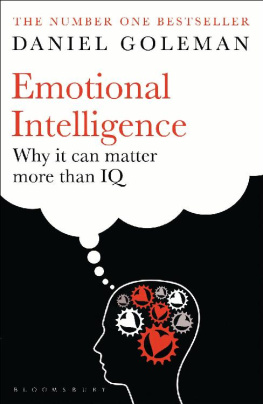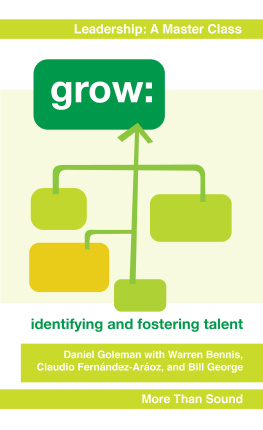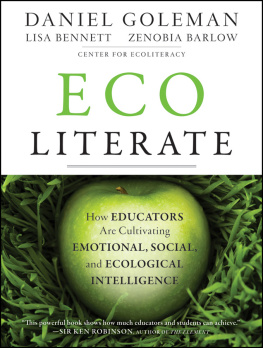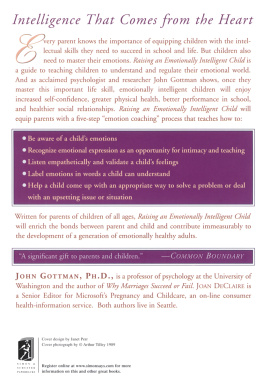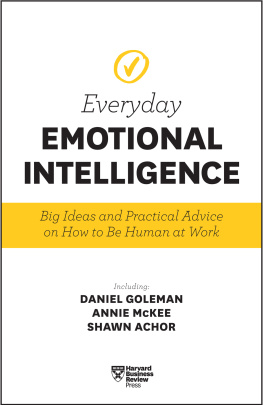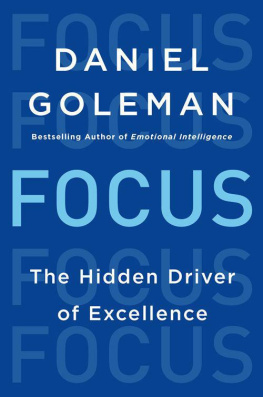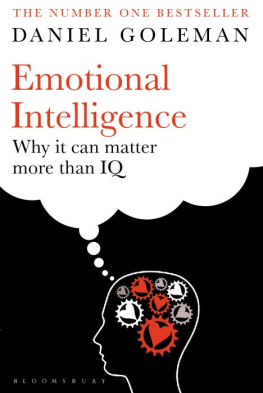EMOTIONAL INTELLIGENCE
EMOTIONAL
INTELLIGENCE
WHY IT CAN MATTER MORE THAN IQ
DANIEL GOLEMAN
For Tara, wellspring of emotional wisdom
Contents
Anyone can become angry that is easy. But to be angry with the right person, to the right degree, at the right time, for the right purpose, and in the right way this is not easy.
A RISTOTLE , The Nicomachean Ethics
It was an unbearably steamy August afternoon in New York City, the kind of sweaty day that makes people sullen with discomfort. I was heading back to a hotel, and as I stepped onto a bus up Madison Avenue I was startled by the driver, a middle-aged black man with an enthusiastic smile, who welcomed me with a friendly, "Hi! How you doing?" as I got on, a greeting he proffered to everyone else who entered as the bus wormed through the thick midtown traffic. Each passenger was as startled as I, and, locked into the morose mood of the day, few returned his greeting.
But as the bus crawled uptown through the gridlock, a slow, rather magical transformation occurred. The driver gave a running monologue for our benefit, a lively commentary on the passing scene around us: there was a terrific sale at that store, a wonderful exhibit at this museum, did you hear about the new movie that just opened at that cinema down the block? His delight in the rich possibilities the city offered was infectious. By the time people got off the bus, each in turn had shaken off the sullen shell they had entered with, and when the driver shouted out a "So long, have a great day!" each gave a smiling response.
The memory of that encounter has stayed with me for close to twenty years. When I rode that Madison Avenue bus, I had just finished my own doctorate in psychologybut there was scant attention paid in the psychology of the day to just how such a transformation could happen. Psychological science knew little or nothing of the mechanics of emotion. And yet, imagining the spreading virus of good feeling that must have rippled through the city, starting from passengers on his bus, I saw that this bus driver was an urban peacemaker of sorts, wizardlike in his power to transmute the sullen irritability that seethed in his passengers, to soften and open their hearts a bit.
In stark contrast, some items from this week's paper:
At a local school, a nine-year-old goes on a rampage, pouring paint over school desks, computers, and printers, and vandalizing a car in the school parking lot. The reason: some third-grade classmates called him a "baby" and he wanted to impress them.
Eight youngsters are wounded when an inadvertent bump in a crowd of teenagers milling outside a Manhattan rap club leads to a shoving match, which ends when one of those affronted starts shooting a .38 caliber automatic handgun into the crowd. The report notes that such shootings over seemingly minor slights, which are perceived as acts of disrespect, have become increasingly common around the country in recent years.
For murder victims under twelve, says a report, 57 percent of the murderers are their parents or stepparents. In almost half the cases, the parents say they were "merely trying to discipline the child." The fatal beatings were prompted by "infractions" such as the child blocking the TV, crying, or soiling diapers.
A German youth is on trial for murdering five Turkish women and girls in a fire he set while they slept. Part of a neo-Nazi group, he tells of failing to hold jobs, of drinking, of blaming his hard luck on foreigners. In a barely audible voice, he pleads, "I can't stop being sorry for what we've done, and I am infinitely ashamed."
Each day's news comes to us rife with such reports of the disintegration of civility and safety, an onslaught of mean-spirited impulse running amok. But the news simply reflects back to us on a larger scale a creeping sense of emotions out of control in our own lives and in those of the people around us. No one is insulated from this erratic tide of outburst and regret; it reaches into all of our lives in one way or another.
The last decade has seen a steady drumroll of reports like these, portraying an uptick in emotional ineptitude, desperation, and recklessness in our families, our communities, and our collective lives. These years have chronicled surging rage and despair, whether in the quiet loneliness of latchkey kids left with a TV for a babysitter, or in the pain of children abandoned, neglected, or abused, or in the ugly intimacy of marital violence. A spreading emotional malaise can be read in numbers showing a jump in depression around the world, and in the reminders of a surging tide of aggressionteens with guns in schools, freeway mishaps ending in shootings, disgruntled ex-employees massacring former fellow workers. Emotional abuse, drive-by shooting, and post-traumatic stress all entered the common lexicon over the last decade, as the slogan of the hour shifted from the cheery "Have a nice day" to the testiness of "Make my day."
This book is a guide to making sense of the senselessness. As a psychologist, and for the last decade as a journalist for The New York Times, I have been tracking the progress of our scientific understanding of the realm of the irrational. From that perch I have been struck by two opposing trends, one portraying a growing calamity in our shared emotional life, the other offering some hopeful remedies.
WHY THIS EMOTION NOW
The last decade, despite its bad news, has also seen an unparalleled burst of scientific studies of emotion. Most dramatic are the glimpses of the brain at work, made possible by innovative methods such as new brain-imaging technologies. They have made visible for the first time in human history what has always been a source of deep mystery: exactly how this intricate mass of cells operates while we think and feel, imagine and dream. This flood of neurobiological data lets us understand more clearly than ever how the brain's centers for emotion move us to rage or to tears, and how more ancient parts of the brain, which stir us to make war as well as love, are channeled for better or worse. This unprecedented clarity on the workings of emotions and their failings brings into focus some fresh remedies for our collective emotional crisis.
I have had to wait till now before the scientific harvest was full enough to write this book. These insights are so late in coming largely because the place of feeling in mental life has been surprisingly slighted by research over the years, leaving the emotions a largely unexplored continent for scientific psychology. Into this void has rushed a welter of self-help books, well-intentioned advice based at best on clinical opinion but lacking much, if any, scientific basis. Now science is finally able to speak with authority to these urgent and perplexing questions of the psyche at its most irrational, to map with some precision the human heart.
This mapping offers a challenge to those who subscribe to a narrow view of intelligence, arguing that IQ is a genetic given that cannot be changed by life experience, and that our destiny in life is largely fixed by these aptitudes. That argument ignores the more challenging question: What can we change that will help our children far better in life? What factors are at play, for example, when people of high IQ flounder and those of modest IQ do surprisingly well? I would argue that the difference quite often lies in the abilities called here emotional intelligence, which include self-control, zeal and persistence, and the ability to motivate oneself. And these skills, as we shall see, can be taught to children, giving them a better chance to use whatever intellectual potential the genetic lottery may have given them.


